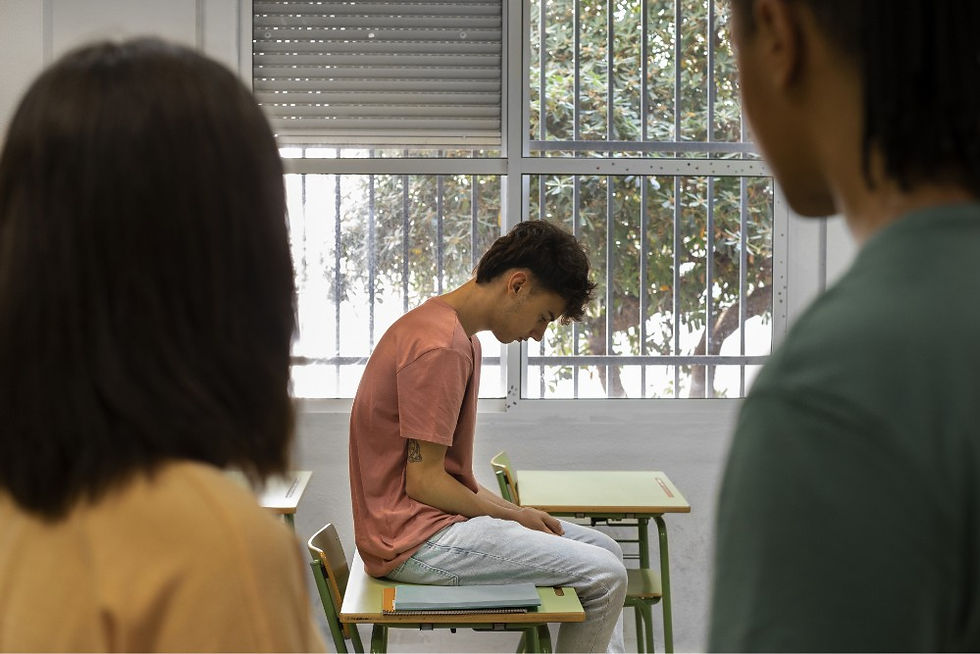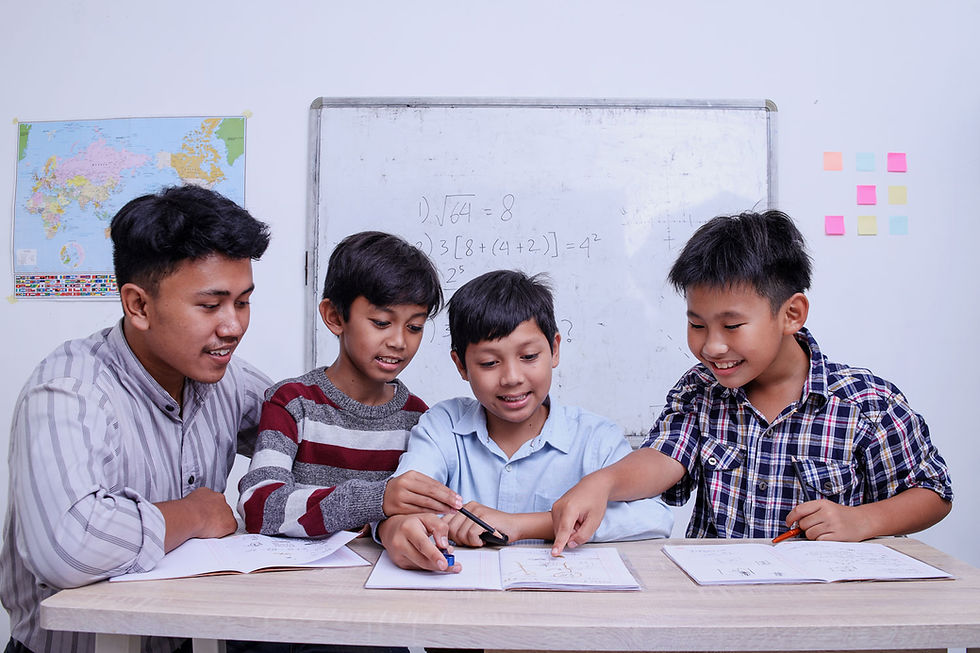What is Family Coaching & How Can It Benefit Families?
- SHINE Children and Youth Services

- May 20, 2025
- 5 min read

Family life in Singapore, while rewarding, is not without its challenges. Many households experience mounting pressure from work, school, and societal expectations.
Parents often find themselves stretched thin, struggling to balance demanding careers with their responsibilities at home. At the same time, children and teens are navigating academic stress, digital distractions, and social pressures, all within the fast-paced context of Singapore’s competitive environment.
These stressors could create tension within the household, leading to communication breakdowns, behavioural challenges, and emotional disconnection among family members. For some families, these issues may be subtle and slow-building; for others, they can escalate into recurring conflict or long-term dysfunction.
This is where family coaching comes in.
What is Family Coaching?
Family coaches support families by helping them strengthen relationships and navigate challenges together. They are trained to respect and adapt to each family’s unique values, dynamics, and circumstances. The primary aim of a family coach is to guide parents and their children toward achieving meaningful and realistic goals.
What distinguishes family coaches from other professionals is their hands-on, home-based approach. By working directly within the family environment, they can gain clearer insights into everyday interactions and identify underlying issues more effectively. This proximity allows them to offer practical, tailored strategies that address the root causes of difficulties and promote lasting positive change.
What to Expect from Family-Centred Coaching
During sessions, coaches use a range of evidence-based strategies to guide families toward healthy, sustainable practices. Some of the most common approaches used are the following:
Reflective Discussion: Coaches use open-ended questions to prompt parents and children to reflect on their actions, routines, and interactions with each other. Rather than offering direct solutions, the coach encourages the caregiver to explore their own thoughts, observations, and comfort levels. This kind of reflective dialogue helps build awareness and confidence.
Collaborative Problem-Solving: When families face a specific challenge, the coach works side by side with them to explore the issue, generate possible solutions, and decide on a plan of action. The goal is to support their decision-making and ownership of the strategies they implement.
Joint Planning: Each coaching session typically ends with a joint plan outlining what families will practice between visits. This includes identifying strategies, routines to target, materials to use, and follow-up steps. During the collaborative planning, the coach helps ensure the plan is realistic, achievable, and tailored to the family’s needs.
Live Observation: Coaches often observe families in action, without interruption, as they go through everyday routines. This allows the coach to better understand the family’s context, forming a foundation for meaningful feedback and support.
Performance Feedback: After observing, coaches provide specific, strengths-based feedback linked to the family’s interactions. This feedback helps reinforce what’s working and provides suggestions for gentle improvement when needed.
Emotional Support: Beyond strategies and skills, coaches are also a source of emotional support. They actively listen, empathise, and build trusting relationships with caregivers. Whether it’s validating feelings or simply offering encouragement, this support helps families feel heard and empowered throughout their journey.
Who Can Benefit from Family Coaching?
Family coaching can benefit a wide range of households across different life stages and situations:
Families facing communication issues: When conversations consistently turn into arguments or silence, coaching can help rebuild connection.
Parents struggling with discipline or behavioural challenges: Coaches guide parents on how to set boundaries while nurturing trust.
Blended families adjusting to new dynamics: Coaching provides support to navigate relationship building, roles, and expectations.
Families undergoing major life transitions: Support may be required to ease major life transitions, such as divorce, relocation, or a significant loss.

What Do Family Coaches Help With?
Some common areas where family coaching makes a significant difference include:
New parent challenges: These include sleep routines, returning to work, or coping with postpartum changes.
Marriage and relationship struggles: Couples learn conflict resolution strategies, rebuilding trust, and reconnecting emotionally.
Parenting support: Parents learn how to manage separation anxiety, discipline concerns, or a child’s emotional outbursts.
Blended family integration: Coaches support step-parents and children in adjusting to new living arrangements and parenting styles.
Teen challenges: Coaches help teens address school refusal, peer pressure, anxiety, or disengagement from school.
Communication breakdowns: Each member of the family will learn how to communicate thoughts and emotions in healthier ways.
Anger and stress management: Family members learn how to build emotional resilience, especially in high-stress households.
Key Benefits of Family Coaching
These are the key advantages of engaging in family coaching sessions:
1. Strengthening Family Bonds
One of the most significant outcomes of family coaching is potentially strengthening emotional connections between family members. Coaches can aid families in understanding each other’s perspectives, which could lead to greater empathy.
As family members learn to collaborate on solutions, they could develop a sense of teamwork and shared purpose. This often leads to increased mutual respect and trust, which can be especially helpful during stressful times or when managing a child’s challenging behaviours.
2. Improving Communication
Miscommunication is one of the most common sources of conflict in families. Coaches support caregivers by introducing practical, respectful communication strategies that reduce misunderstandings and emotional tension.
Techniques often include:
Active listening so that family members show they are present and engaged.
Using “I” statements to promote responsibility for one’s feelings without assigning blame (e.g., “I feel overwhelmed when we’re rushed in the morning”).
Checking for understanding to ensure messages are received as intended.
As these skills are practised and internalised, families may be more inclined to engage in productive conversations, especially during emotionally charged moments.
3. Enhancing Decision-Making and Problem-Solving
Family coaching shifts the dynamic from reacting to issues to proactively addressing them together. With the coach’s support, families learn structured approaches for setting goals, exploring options, and making decisions that reflect everyone's needs.
4. Potentially Create a More Peaceful Home Environment
Through healthier habits, stronger relationships, and stress reduction techniques, coaching can help families cultivate a calmer, more predictable home life. Tools like daily routines, mindful practices, or conflict de-escalation techniques could help bring more balance and harmony to the household.
Explore Community Supports for Children, Youth, and Parents in Singapore
The family unit is seen as the cornerstone of Singaporean society. Strong families lay the foundation for emotionally resilient children, healthy parent-child relationships, and a more cohesive community. However, every family faces unique challenges, whether it's managing work-life balance, coping with a child's behavioural difficulties, or adjusting to major life transitions. That's why community support systems play a vital role in helping families thrive.
Across the country, there are a variety of services and programmes designed to strengthen family relationships, like parenting workshops, youth mentoring programmes, and counselling services. Such supports aim to empower families with tools to better connect, communicate, and grow together, especially during difficult times.
Among the many community organisations in Singapore, SHINE Children and Youth Services stands out as a children's charity that provides support for at-risk children and youth. Our youth and children charity particularly works with those who may be struggling with mental health concerns or challenges with academics or family life. Whether it's coping with grief or dealing with stress from academic or social pressures, SHINE provides timely, professional intervention through children and youth counselling, therapy sessions, and mentoring programmes.
But the support doesn’t stop with children and youth. SHINE also works closely with parents and caregivers, helping them better understand their child's behaviour, emotions, and needs. Through guided sessions, parents learn how to build stronger connections with their children. These collaborative efforts ensure that both the child and their family receive the emotional foundation needed to move forward with greater confidence and resilience.
For more insights into how parents can promote healthy family dynamics within the home, learn how you can support your child’s mental health.




Comments